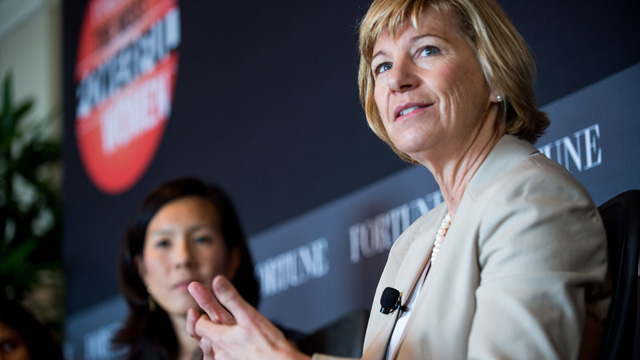UCSF Chancellor Looks Back and Looks Ahead Before Leaving for Gates Foundation

UCSF Chancellor Looks Back and Looks Ahead Before Leaving for Gates Foundation
The University of California has six medical schools and one of them -- UC San Francisco -- is about to undergo a major change. At the end of this month UCSF Chancellor Susan Desmond-Hellmann is leaving to become CEO of the Bill and Melinda Gates Foundation, which has a major focus on global health.
Desmond-Hellmann was an unconventional choice to head up UCSF -- she came from the biotech company Genentech, where she directed the development of new drugs.
Scott Shafer sat down with her this week and began by asking if she felt any particular challenge, being the first female to head the university in its 150-year history.
SCOTT SHAFER: You were the first female chancellor for UCSF in the 150-year history of that institution. No telling if the next chancellor will also be a woman, but did you feel a particular pressure or resistance to you as you came in and how did you overcome that?
SUSAN DESMOND-HELLMANN: On the front of being the first female chancellor, I had zero resistance. And felt no pressure as the first woman chancellor. I felt that it was a much more odd thing for me to be from private industry. And so I did feel some pressure that individuals looked to me as potentially a drug-company lady. Or someone from biotech that they might be suspicious that I would value private industry over our public mission. And so I think (that was) the unusual thing about my chancellorship at the beginning, which I think people quickly saw how I acted and that I’m as passionate about our public mission as anyone. But I think that was more odd than my gender.
SHAFER: UCSF is a nearly $ 4 billion enterprise and it’s one of six medical schools in the University of California system: Davis, UCLA, Irvine, (San Diego), most recently Riverside. What’s the case for having so many medical schools in one state school system?
DESMOND-HELLMANN: Well, it's a huge asset to the state of California and the case for having so many medical schools is that health is largely a local issue. Communities are really important when you’re trying to drive health. Communities have different values; they have different ways of approaching things like exercise, diet, healthy behaviors. And so, a lot of health is local. So having a local medical school that can serve that community and interact with that community is a positive. On the other hand, there is a coalition of all the UC medical centers and the medical schools called UC Health, and increasingly UC Health is trying to drive the health of California.
SHAFER: We’re in the midst of implementing health care reform in this country. Is there a chance that institutions like UCSF are really going to suffer because of the whole model of fee for service and going to an expert to see, to get something checked out … That’s really being squeezed a bit with health care reform, isn’t it?
DESMOND-HELLMANN: Our leadership anticipated that no matter what happened with the Affordable Care Act, we would need to lower our prices, we would need to focus on access and we would need to change the way we operate from that fee for service, to looking at safety, affordability -- very different for an academic medical center. But we need to do that while continuing to innovate, continuing to seek cures for diseases and continuing to be leaders academically.
SHAFER: You're leaving UCSF to become the CEO of the Bill and Melinda Gates Foundation up in Washington. And they focus on global health, among other things. There's been some concern expressed recently about rich guys like Bill Gates, Larry Ellison, Eric Schmidt down at Google ... spending a lot of money, on research and health issues that they find to be important and in some way that could undermine science for the common good. What do you think of that criticism?
DESMOND-HELLMANN: Well, I'm a big fan of public dialogue. I wouldn’t have gone to a public university if I didn’t embrace public dialogue. And as an innovator and somebody whose participated in avenues of, for example, new cancer medicines, I found the engagement by breast cancer advocates frightening at first (laughs) and then ...
SHAFER: Noisy.
DESMOND-HELLMANN: Noisy, frightening, frankly a little annoying, and my evolution as an innovator to embracing that and recognizing that that dialogue led us to better outcomes. I think the same is true with philanthropy. I am thrilled that Bill and Melinda Gates and Warren Buffett have decided to take their wealth and try and have all lives have equal value. I mean, that really resonates with me. I’m thrilled about that. Does that mean that no one should question or challenge the focus of the foundation? Or give input? Absolutely not. I would welcome that, and being in California, I think it's in our DNA, to believe that healthy dialogue and debate brings better outcomes.
SHAFER: Chancellor Susan Desmond Hellman, thank you so much.
DESMOND-HELLMANN: Thank you.
